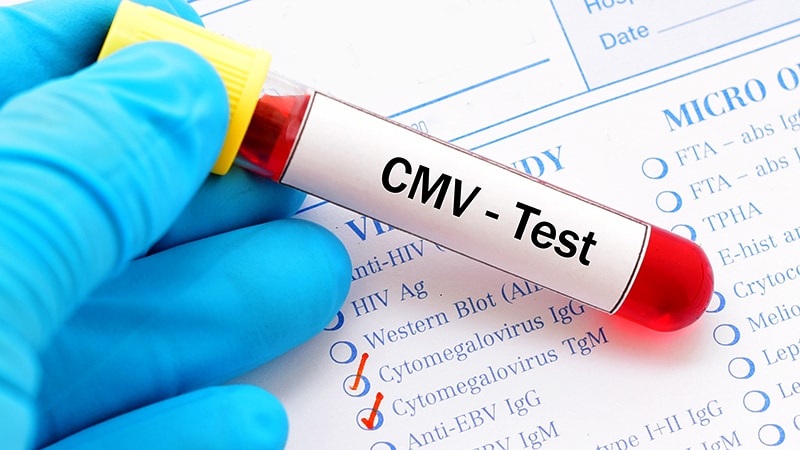The US Food and Drug Administration (FDA) has approved letermovir (Prevymis) for the additional indication of prevention of cytomegalovirus in high-risk adult kidney transplant recipients.
The approval for CMV disease prophylaxis in adult kidney transplant recipients is based on a phase 3 trial of the drug, published this week in the Journal of the American Medical Association, by Ajit P. Limaye MD, of UW Medicine, Seattle, Washington and colleagues, and simultaneously presented at the American Transplant Congress 2023 in San Diego.
Cytomegalovirus (CMV) is a serious infection that can cause disease in organ transplant recipients and can raise the risk of organ rejection. CMV is common, with more than half of adults in the US infected by age 40, according to estimates from the US Centers for Disease Control and Prevention, although most people have no symptoms.
The widespread prevalence of the virus means there’s a risk that organ donors may transmit it when they donate. People who do not have the virus in their blood but receive an organ from someone who does are at the highest risk of contracting the virus and developing the disease.
Letermovir , manufactured by Merck, is an antiviral that inhibits the replication of CMV by targeting its DNA terminase complex. It was approved by the FDA in 2017 for prophylaxis of CMV infection and disease in adult CMV-seropositive recipients of an allogeneic hematopoietic stem cell transplant.
The new trial compared the efficacy and safety of letermovir to the antiviral valganciclovir for preventing CMV in high-risk CMV-negative kidney transplant recipients who received an organ from a CMV-positive donor.
Intravenous ganciclovir, or its oral prodrug valganciclovir, are the antivirals generally used for the prevention and treatment of CMV infection, according to Zoe Raglow, MD, and Daniel Kaul, MD, from the University of Michigan Medical School, who co-authored an accompanying editorial about the study, also published in JAMA.
But valganciclovir/ganciclovir can cause significant myelosuppression, according to the editorialists, leading patients to potentially stop taking the drug early or lower the dosage.
Another antiviral maribavir (Livtencity), which inhibits the activity of a viral protein kinase, was approved in November 2021 for the treatment of post-transplant CMV that is resistant to other drugs in transplant recipients aged 12 years or older who weigh at least 35 kg (77 pounds).
Results “Practice Changing” but Letermovir 20X More Than Valganciclovir
The new study was a phase 3, randomized, active-controlled, double masked, double-dummy, noninferiority trial comparing letermovir with valganciclovir and included 589 participants across 94 international locations. In the week following their kidney transplant, one group received letermovir 480 mg once-daily with 400 mg acyclovir twice daily (n = 292), and a valganciclovir placebo. Letermovir was administered either orally or intravenously; the dose was the same regardless of the route of administration. The other group received valganciclovir 900 mg daily, with placebos for letermovir and acyclovir (n = 297). Participants took the drugs for up to 200 days after their transplant.
The study found letermovir was noninferior to valganciclovir through week 52 after a kidney transplant, with 10% of patients in the letermovir group developing CMV disease compared with 12% in the valganciclovir group.
Patients in the letermovir group were also less likely to develop early disease: the letermovir group had no cases of CMV disease compared with 1.7%, or five cases, developing in the valganciclovir group, at week 28.
None of the 52 participants in the letermovir group who were evaluated for suspected CMV disease had resistance-associated substitutions, compared with 12% of the valganciclovir group.
“The surprising absence of resistance sequence variants or breakthrough disease in this prevention trial is a critical and somewhat unexpected finding,” Raglow and Kaul write in their editorial.
The rate of myelosuppression was lower in the letermovir group (26%) compared with the valganciclovir group (64%), meaning drug discontinuation due to adverse events is less likely with letermovir.
The most common adverse effect was diarrhea, which was reported in at least 10% of patients in the letermovir group, as well as tremor and urinary tract infection.
However, the new treatment costs more than 20 times that of generic valganciclovir, according to the editorial, at about $250 a day, “making it one of the most expensive routine posttransplant medications,” say the editorialists. The use of letermovir also requires dose adjustments of immunosuppressive medications.
Nevertheless, the study by Limaye et al “is a major step forward in demonstrating that letermovir is an equally effective and better tolerated antiviral option when used as universal prophylaxis in high-risk kidney transplant recipients,” and the results “are practice changing,” they conclude.
The study was funded by Merck Sharp & Dohme LLC, a subsidiary of Merck & Co.
JAMA. Published online June 6, 2023. Full text, Editorial
For more news, follow Medscape on Facebook, Twitter, Instagram, YouTube, and LinkedIn
Source: Read Full Article
